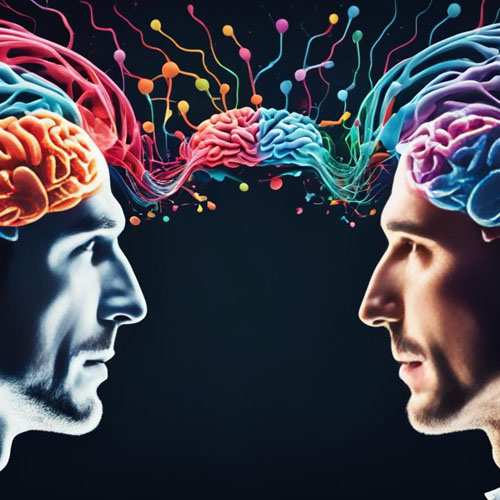
Introduction
Neuro-Linguistic Programming (NLP) is a
powerful tool used in personal development, therapy, business, sports, and even
education. With techniques designed to reshape thought patterns, language, and
behavior, NLP helps individuals overcome limitations, develop confidence, and
achieve their goals. Let’s explore some fascinating real-world case studies
that demonstrate the diverse applications of NLP and its potential to bring
about meaningful change.
Case Study 1: Overcoming Phobias and
Anxiety in Therapy
Challenge: A
young woman named Sarah struggled with severe social anxiety, specifically a
deep fear of public speaking and social interactions. Despite having the skills
for a leadership role, her fear held her back from career growth.
NLP Solution:
Sarah’s therapist, trained in NLP, used a combination of techniques, including anchoring
and reframing. Anchoring involved associating a sense of calm with a
physical gesture—pressing her thumb and index finger together. Whenever she
felt nervous, she could use this anchor to ground herself. Reframing involved
shifting her internal dialogue from self-criticism to supportive, empowering
statements.
Outcome:
Over time, Sarah’s self-talk became more positive, and she felt more
comfortable and confident in social situations. Using her anchor before public
speaking allowed her to access calmness on demand, and she ultimately felt
empowered to step into her desired leadership role. This case demonstrates how
NLP techniques can alleviate phobias and anxiety, allowing individuals to
unlock their potential.
Case Study 2: Enhancing Athletic
Performance in Sports
Challenge:
Mark, a competitive tennis player, experienced inconsistent performance due to
negative self-talk and pressure during matches. Despite his physical skill, his
mental game was affecting his results.
NLP Solution:
Mark’s NLP coach used visualization and submodalities (changing
the way thoughts are perceived) to transform his mindset. Visualization
involved mentally rehearsing successful gameplay, imagining each serve and
volley executed with precision. Submodalities were used to help Mark reduce the
emotional intensity of past losses by imagining them in black-and-white rather
than vivid color, effectively diminishing their impact on his present mindset.
Outcome: By
consistently visualizing success and detaching from past losses, Mark’s
confidence increased, and he felt calmer and more focused during matches. His
performance became more consistent, and he began winning more frequently. NLP’s
ability to strengthen the mental game is why it’s increasingly popular among
athletes worldwide.
Case Study 3: Increasing Sales in
Business Through Effective Communication
Challenge: A
sales team at a tech company was underperforming, mainly due to struggles in
building rapport with clients and effectively handling objections during sales
calls.
NLP Solution:
The company brought in an NLP consultant to train the team on mirroring
and language patterns. Mirroring involved subtly matching a client’s
body language and tone to create a sense of connection. Language patterns, such
as embedded commands and metaphors, helped the sales team
communicate more persuasively. For example, instead of saying, “You need this
product,” they would embed commands in softer language, like, “Imagine how much
easier your workday would be with this solution.”
Outcome: The
team began seeing noticeable improvements in client responses. By using
mirroring techniques and strategically chosen language patterns, they
established rapport faster and overcame objections with greater ease. The sales
team’s success rate increased by over 30% in the following quarter,
demonstrating NLP’s effectiveness in business communication.
Case Study 4: Empowering Students to
Improve Academic Performance
Challenge: A
high school teacher noticed that several students were struggling with low
confidence and motivation in math, which was impacting their performance. The
students often expressed self-defeating beliefs like, “I’m just bad at math.”
NLP Solution:
The teacher incorporated belief change techniques and positive
language patterns into the classroom. Students practiced reframing negative
beliefs by challenging thoughts like “I’m bad at math” with new, growth-focused
beliefs, such as “I’m learning new skills in math every day.” The teacher also
guided students in visualizing success before tests and using mental rehearsal
to build familiarity with solving math problems.
Outcome:
Over time, students’ confidence increased, and they approached math problems
with a more open and motivated mindset. Many of them improved their grades
significantly, and more importantly, they developed a resilient attitude toward
challenges. This case illustrates how NLP can support educators in building
student confidence and motivation.
Case Study 5: Rapid Recovery from
Physical Injury in Therapy
Challenge:
James, a professional dancer, suffered a knee injury that required surgery and
rehabilitation. Despite the physical healing process going well, he experienced
anxiety and a fear of re-injury, which affected his confidence and prevented
him from returning to dancing.
NLP Solution:
James’ therapist used timeline therapy, an NLP technique that helps
individuals revisit past experiences to change their emotional impact. He also
practiced mental rehearsal to visualize himself dancing confidently
without fear. By mentally rehearsing pain-free movements and creating a
positive memory of himself fully healed, James began to reduce his mental
barriers.
Outcome:
With regular mental rehearsal, James regained confidence in his body’s
resilience and strength. He returned to dance and eventually performed as he
had before his injury. This case shows how NLP can be instrumental in
overcoming mental blocks associated with physical recovery.
Conclusion
These case studies highlight NLP’s
versatility in addressing a wide range of challenges—from overcoming phobias to
improving athletic performance, sales communication, academic confidence, and
recovery from injury. Whether used in therapy, sports, business, or education,
NLP techniques empower individuals to reshape their thoughts, emotions, and
behaviors for lasting positive change.
For anyone looking to overcome personal
limitations or achieve new levels of success, NLP offers a toolkit to unlock
potential and transform lives.
NLP’s impact is powerful and often
life-changing, as shown in these cases. If you're curious about NLP, consider
exploring techniques that might benefit your personal or professional life!

We are always ready to help you. Please fill the below form and we will get back to you as soon as possible.